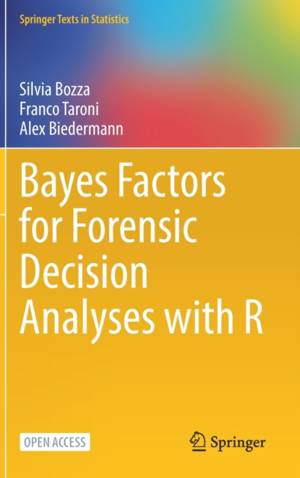
- Afhalen na 1 uur in een winkel met voorraad
- Gratis thuislevering in België vanaf € 30
- Ruim aanbod met 7 miljoen producten
- Afhalen na 1 uur in een winkel met voorraad
- Gratis thuislevering in België vanaf € 30
- Ruim aanbod met 7 miljoen producten
Omschrijving
Bayes Factors for Forensic Decision Analyses with R provides a self-contained introduction to computational Bayesian statistics using R. With its primary focus on Bayes factors supported by data sets, this book features an operational perspective, practical relevance, and applicability--keeping theoretical and philosophical justifications limited. It offers a balanced approach to three naturally interrelated topics:
- Probabilistic Inference - Relies on the core concept of Bayesian inferential statistics, to help practicing forensic scientists in the logical and balanced evaluation of the weight of evidence.
- Decision Making - Features how Bayes factors are interpreted in practical applications to help address questions of decision analysis involving the use of forensic science in the law.
- Operational Relevance - Combines inference and decision, backed up with practical examples and complete sample code in R, including sensitivity analyses and discussion on how to interpret results in context.
Over the past decades, probabilistic methods have established a firm position as a reference approach for the management of uncertainty in virtually all areas of science, including forensic science, with Bayes' theorem providing the fundamental logical tenet for assessing how new information--scientific evidence--ought to be weighed. Central to this approach is the Bayes factor, which clarifies the evidential meaning of new information, by providing a measure of the change in the odds in favor of a proposition of interest, when going from the prior to the posterior distribution. Bayes factors should guide the scientist's thinking about the value of scientific evidence and form the basis of logical and balanced reporting practices, thus representing essential foundations for rational decision making under uncertainty.
This book would be relevant to students, practitioners, and applied statisticiansinterested in inference and decision analyses in the critical field of forensic science. It could be used to support practical courses on Bayesian statistics and decision theory at both undergraduate and graduate levels, and will be of equal interest to forensic scientists and practitioners of Bayesian statistics for driving their evaluations and the use of R for their purposes.
This book is Open Access.
Specificaties
Betrokkenen
- Auteur(s):
- Uitgeverij:
Inhoud
- Aantal bladzijden:
- 187
- Taal:
- Engels
- Reeks:
Eigenschappen
- Productcode (EAN):
- 9783031098383
- Verschijningsdatum:
- 1/11/2022
- Uitvoering:
- Hardcover
- Formaat:
- Genaaid
- Afmetingen:
- 156 mm x 234 mm
- Gewicht:
- 458 g

Alleen bij Standaard Boekhandel
Beoordelingen
We publiceren alleen reviews die voldoen aan de voorwaarden voor reviews. Bekijk onze voorwaarden voor reviews.











